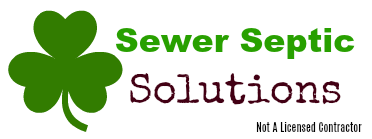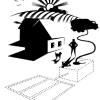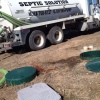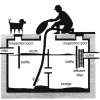What you put into your septic system will have a direct effect on whether or not you have a healthy, long-lasting and trouble-free system. Your septic system is not a dispose-all.
• Conserve water to avoid overloading the septic system. Be sure to repair any leaky faucets or toilets. Use low-flow fixtures.
• Do not use caustic drain openers for a clogged drain. Instead, use boiling water or a drain snake to open clogs.
• Do not use septic tank additives, commercial septic tank cleansers, yeast, sugar, etc. These products are not necessary, and some may be harmful to your system.
• Use commercial bathroom cleaners and laundry detergents in moderation. Many people prefer to clean their toilets, sinks, showers, and tubs with a mild detergent or baking soda.
• Check with your local regulatory agency if you have a garbage disposal to make sure that your septic system can accommodate
this additional waste.
• Check with your local regulatory agency before allowing water softener backwash to enter your septic tank.
• Your septic system is not a trash can. Do
not put disposable diapers, sanitary napkins, tampons, condoms, paper towels, facial tissues, plastics, cat litter, or cigarettes into your septic system. These items quickly fill your septic tank with solids, decrease the efficiency, and will require that you pump out the septic tank more frequently. They may also clog the sewer line to the septic system causing wastewater to back up into your home.
• Avoid dumping grease or fats down
your kitchen drain. They solidify and the accumulation may contribute to blockages in your system.
• Keep latex paint, varnishes, thinners, waste oil, photographic solutions, pesticides, or other hazardous chemicals out of your system. Even in small amounts, these items can destroy the biological digestion taking place within your septic system.
• Septic systems are a very simple way to treat household wastewater and are easy to operate and maintain. Although homeowners must take a more active role in maintaining septic systems, once they learn how their systems work, it is easy for them to appreciate the importance of a few sound operation and maintenance practices.
This article comes from the National Small Flows Clearinghouse. For more information about this or other NSFC products, please contact: National Small Flows Clearinghouse West Virginia University P.O. Box 6064 Morgantown, WV 26506-6064 or phone:
(800) 624-8301, (304) 293-419 www.nsfc.wvu.edu





